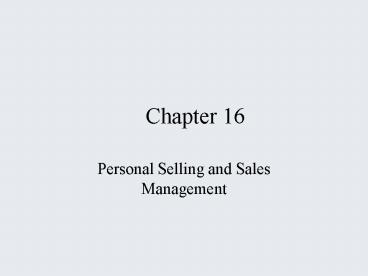Personal Selling and Sales Management - PowerPoint PPT Presentation
1 / 13
Title:
Personal Selling and Sales Management
Description:
Most salespeople are well-educated, well-trained professionals ... Order taker (department store salesperson) Order getter (someone engaged in creative selling) ... – PowerPoint PPT presentation
Number of Views:173
Avg rating:3.0/5.0
Title: Personal Selling and Sales Management
1
Chapter 16
- Personal Selling and Sales Management
2
Nature of Personal Selling
- Most salespeople are well-educated, well-trained
professionals who work to build and maintain
long-term relationships with customers. - The term salesperson covers a wide spectrum of
positions from - Order taker (department store salesperson)
- Order getter (someone engaged in creative
selling) - Missionary salesperson (building goodwill or
educating buyers)
3
What is Personal Selling?
- Involves Two-Way, Personal Communication Between
Salespeople and Individual Customers Whether - face to face,
- by telephone,
- through video conferencing,
- or by other means.
4
Personal Selling
- STRENGTHS
- Flexibility
- Minimizes wasted effort
- Facilitates buyer action
- Multiple capabilities
- WEAKNESSES
- High cost
- Finding and retaining salespeople
- Message inconsistency
- Motivation
13.2
1998 by Prentice Hall
?
5
The Role of the Sales Force
- Personal selling is effective because salespeople
can - probe customers to learn more about their
problems, - adjust the marketing offer to fit the special
needs of each customer, - negotiate terms of sale, and
- build long-term personal relationships with key
decision makers.
6
Major Steps in Sales Force Management (Fig. 16.1)
Designing Salesforce Strategy and Structure
Recruiting and Selecting Salespeople
Training Salespeople
Compensating Salespeople
Supervising Salespeople
Evaluating Salespeople
7
Sales Force Structure
8
Designing Sales Force Strategy and Structure
Territorial Exclusive Territory to Sell the
Companys Full Product Line
Product Sales Force Sells Only a Portion of The
Companys Products or Lines
Customer Sales Force Sells Only to
Certain Customers or Industries
9
Some Traits of Good Salespeople
10
Motivating Sales Representatives
Pay
Promotion
Personal growth
Accomplishment
()
Value Level
Respect
(-)
Security
Recognition
11
How Salespeople Spend Their Time (Fig. 16.2)
Administrative
Service Calls
Tasks
Companies Look For Ways to Increase the Amount of
Time Salespeople Spend Selling.
12.7
16
Telephone
Selling
25.1
Face-to-Face
Selling
28.8
Waiting/
Traveling
17.4
12
Steps in the Selling Process
Prospecting
Salesperson Identifies Qualified Potential
Customers.
Qualifying
Process of Identifying Good Prospects and
Screening Out Poor Ones.
Preapproach
Salesperson Learns as Much as Possible About a
Prospective Customer Before Making a Sales Call.
Approach
Salesperson Meets the Buyer and Gets the
Relationship Off to a Good Start.
13
Steps in the Selling Process
Presentation
Salesperson Tells the Product Story to the
Buyer Using the Need-Satisfaction Approach.
Handling Objections
Salesperson Seeks Out, Clarifies, and Overcomes
Customer Objections to Buying.
Closing
Salesperson Asks the Customer for an Order.
Follow-Up
Occurs After the Sale and Ensures Customer
Satisfaction and Repeat Business.































